Gaurav Gill: Moving On
"A year which is best forgotten."
It's the first time I've had the chance to speak to Gaurav Gill since the fateful incident at the Rally of Jodhpur in September 2019. And given the tragic circumstances that surround the incident, and given everything that transpired in its aftermath, his choice of words is hardly surprising. To say that his has been a tumultuous year, is an understatement. It is as if someone documented the very worst nightmare that a human being, not just a motorsport athlete, could have, and then arranged for exactly that to happen. An ongoing rally, a motorcycle carrying three people that had forcibly entered a closed rally stage, and an unavoidable collision that led to the loss of three lives.
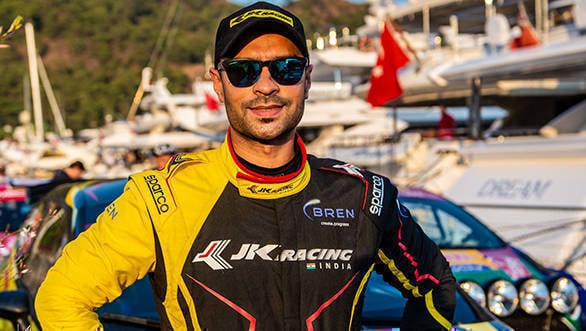 Happier times for Gaurav Gill, seen here at the 2019 WRC Rally Turkey
Happier times for Gaurav Gill, seen here at the 2019 WRC Rally Turkey
Using words like tragic, calamitous, grievous and heartbreaking to describe what happened, while absolutely true, doesn't help. Because these are just words. Words that cannot undo what happened. Nothing can bring those three people back, no amount of comforting will truly bring peace to the surviving members of their family. And no one can truly share the burden that Gaurav Gill has to bear himself. Life for him has now been irrevocably altered. Changed forever by those few seconds.
"Everything happened so quickly and so fast, that I don't even know what happened," Gill says of the incident. I haven't outright asked him about what happened that day, because I'm not sure that I want to force him into dredging up bad memories. Instead, over the course of our conversation, he begins talking about that day himself. "Imagine if I don't know what happened, then who would, better than me," he says, speaking of how it all happened in the matter of split seconds. I suppose it's also a reference to the fact that other than him, and co-driver Musa Sherif, no one can truly know what happened. "I mean I know my skill level, and I trust my ability. I would 100 per cent trust my ability (to take evasive action), even if it meant that I had to put myself in danger. But imagine, if I didn't even see what happened. In fact the impact was such that it was smack in the centre of the car, if you would have seen the images. It shows I didn't even have the opportunity to avoid it."
The fact that the incident had taken place was terrible enough. But the way things were handled, made matters far worse. The organisers seemingly packed up, the representatives of the FMSCI weren't there to help explain what happened to the authorities or to the crowd of villagers that had gathered. And Gill and Sherif, backed only by Mahindra Adventure boss Bijoy Kumar Y and JK Tyre's Head of Motorsport Sanjay Sharma, had to fend for themselves, bringing in their own lawyers from Delhi.
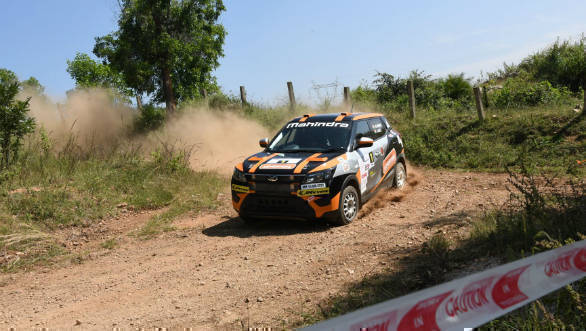 Gill and Musa Sherif in their Mahindra at the 2019 K1000 Rally
Gill and Musa Sherif in their Mahindra at the 2019 K1000 Rally
"I've always said that in these kind of situations, it's best if everyone works together as a team, rather than splitting up and trying to save themselves. You work together as a team, because you were there as a team. When incidents like this don't happen, you want each others' support for the sport, right? So everyone works together. So why not when something like this happens?" he asks. It's a fact Gill brought up in the very first interview that he gave after the incident. And an interview that, one imagines, led to some amount of criticism from the powers-that-be within the sport. Despite the fact that he had good reason for saying exactly what he did. But now that some time has gone by, Gill says somewhat pensively, "Anyway, it didn't happen, so it didn't happen. There's no point going and crying about it now."
In the aftermath of the Jodhpur incident, Gill chose to skip his second WRC2 outing for 2019, the Wales Rally GB. He says it was far too soon for him to have been back in a rally car. The event after Wales was the RACC Rally Catalunya in Spain, that I happened to attend. Everyone in the WRC paddock had heard of the horrific incident that had taken place in India, and Gill had the collective sympathy of the international rally community. At one point, I found myself amongst a group of journalists speaking to WRC driver Esapekka Lappi. He'd been Gill's teammate at Team MRF Skoda back in 2013, the year the Indian driver won the first of his three APRC titles. Someone asked Lappi what he thought of Gill's talent as a driver, and even while responding and saying something complimentary, he trailed off with a worried, "But I heard there was some sort of accident " He wasn't the only member of the international rallying community who needed to be assured that Gill himself was as okay as was possible given the circumstances, and that he was set to be back in a rally car at the following round.
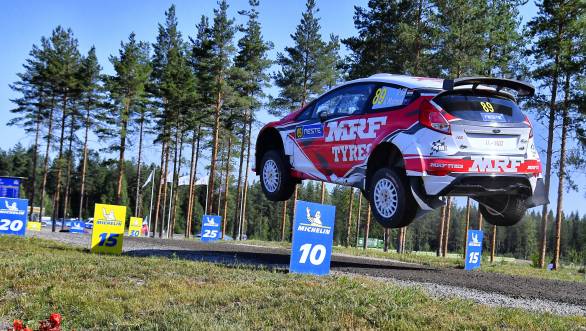 Back in 2018 three-time APRC champion Gill managed a personal record for longest yump at Rally Finland
Back in 2018 three-time APRC champion Gill managed a personal record for longest yump at Rally Finland
That round was meant to be the season-ending Rally Australia 2019. It was the event at which Gill was to return to the wheel of his JK Tyre-sponsored M-Sport Fiesta R5. It was also meant to be the event at which he would speak with one of the world's top sports psychologists, in order to help him cope better with the trauma and mental stress he was under. But with forest fires raging across most parts of the continent, the rally was cancelled, as was Gill's appointment with the sports psychologist, who he says he only managed to speak with very briefly. But while he was at Rally Australia, in the days leading up to the events' cancellation, Gill tells me that he didn't have an attack of the nerves. "I was not nervous there for some reason. I don't know why. Whether it was because of the atmosphere there, or the professional set-up that the WRC has. Maybe that was the reason, that I was quite okay," he says. At the next event on the INRC calendar, things were very different.
"At the K1000, I don't know whom I was speaking to, Bijoy or someone, and I said 'This is probably the first time in my life, or rather the second, that I'm actually nervous.' The first time was when I went for my first rally at 18 years old," he says. "And Leela (N. Leelakrishnan - multiple national rally champion and ace car tuner) was alongside me, and he overheard what I was saying and he actually came to me and said 'I've never heard that from you ever'." It was proof that Gill, no matter how skilled he might be behind the wheel of a rally car, and how seemingly impervious he might be to things around him, is human. Just like the rest of us. And while he tells me the incident had shaken him up rather badly, he also says he isn't afraid to talk about how he feels. And the fact that getting back in the car wasn't easy. "This is what it is. I think until the first few kilometres I was still very nervous to drive the car. My hands and my fingers were twitching, because I was way too nervous more than I am normally as a person."
The nerves, however, didn't reflect in the timing sheets at the K1000. Gill and Sherif ended the first day of the rally leading by 50 seconds over their competitors, before mechanical issues forced them into retirement during the second leg of the rally. Someone from within the Mahindra camp later told me, "He didn't look like he was really going that fast, but he was the quickest car around!"
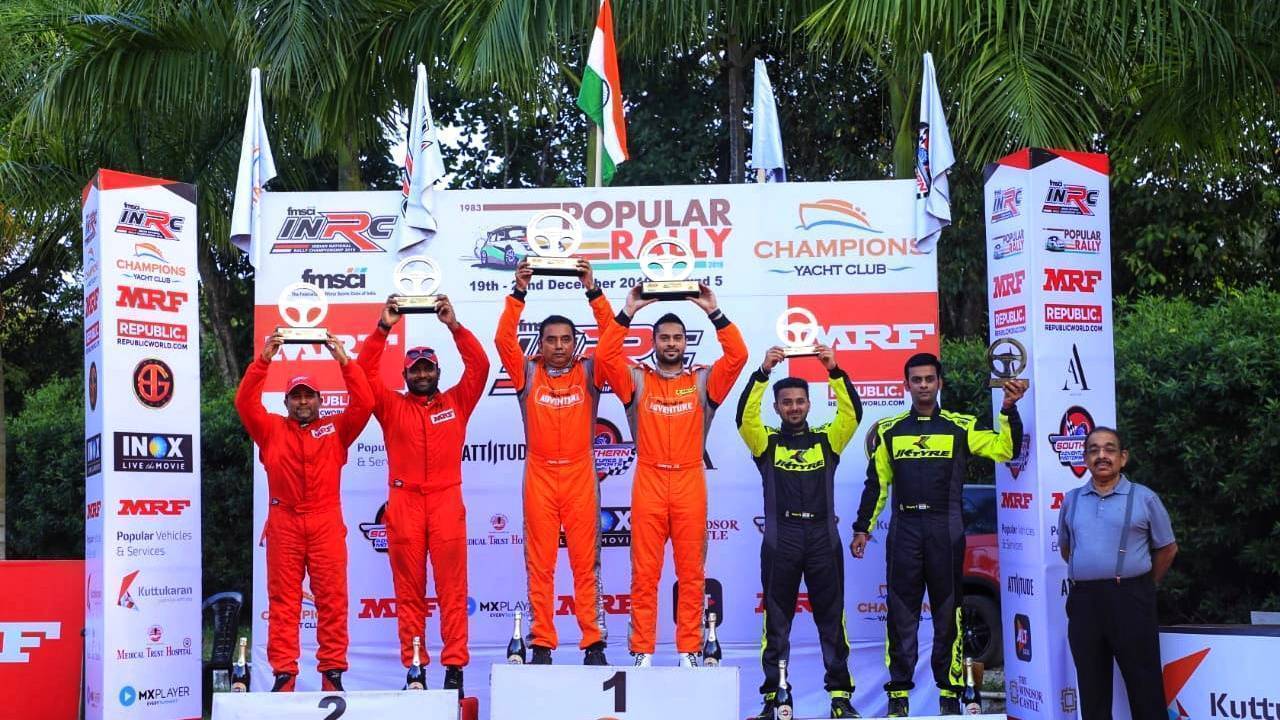 Overall winners at the 2019 INRC season finale - the Popular Rally
Overall winners at the 2019 INRC season finale - the Popular Rally
But Jodhpur isn't a closed chapter in Gill's life. He was initially booked under Section 304 of the Indian Penal Code (culpable homicide not amounting to murder). After a police investigation, that was changed to Section 304 A (death due to negligence). It means that Gill still needs to present himself before the court, with his lawyer, and fight to prove his innocence. The fact that the death of bystanders in other sporting events hasn't ever led to the athletes being chargesheeted is, naturally, something that bothers him. "I still have to fight for my freedom, and for justice to be given to me, because it wasn't my fault. It was purely a racing incident," he says. But India has a tenuous relationship with fast cars, and motorsport is often viewed as something wasteful and reckless. A rich man's sport at best. It is unfortunate that the person bearing the brunt of this attitude, is also the country's most accomplished international motorsport athlete.
I ask Gill how he manages to compartmentalise things? How he manages to lock away the ongoing court case in one part of his mind, allowing the motorsport athlete in him to excel at the same time? The answer, unsurprisingly, is that it isn't easy. "It's completely difficult!" he says. "What you said (compartmentalising things) is the hardest thing to do. To activate yourself to being what you were, and what you are capable of being... It's the biggest obstacle that I have, and it's been extremely difficult for me," he continues. It hasn't helped that every now and again, reminders of the accident come flying out at him from unexpected sources. Despite trying to ensure that his young children don't get wind of the matter, Gill tells me that his older son heard about the incident from his friends in school, who probably heard it from their parents. "It was a very disturbing moment not only for myself, but even for the children," he says.
But, even with the situation being as difficult as it is, Gill says that he isn't cutting himself any slack. "I'm very hard on myself. I just tell myself 'Go flat out or go home. Toughen up for the moment, and make the most of wherever you are, because you don't get second chances in life,'" he says. Part of the process of toughening up involves a rigorous, new physical and mental fitness routine. "I've been training myself mentally and physically very much. Because in the last couple of months my main motivation has been to be extremely fit so that I have all the positivity around me and within me. I've changed the way I train, I've changed the way I speak to people. It's been a life-changing experience," he says.
What's also helped him maintain a slightly positive outlook, is the solidarity the motorsport community showed when they banded together to support him. "To say that I saw a massive support from the motorsport community would be an understatement. It was overwhelming to see how everybody came forward. Especially the guys from the rallying community, the people who were my competitors, teammates, championship mates from rallying, and from racing as well. It was a huge amount of support, especially from the young guys," he says. It's the same community of people who came out in support of him when the controversy broke about his Arjuna Award application something that Gill, and most people from the motorsport fraternity, have shrugged off entirely. But his biggest source of support is much closer to home. "I think the most important people and my biggest strengths have been my wife and my mother, through this," he says.
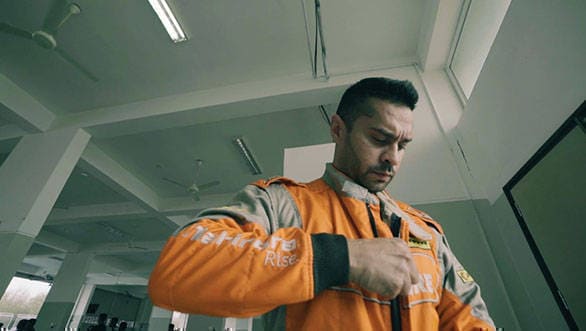
Despite the difficult year he's had, and despite the fact that the accident occurred at a round of the Indian National Rally Championship, Gill says he never contemplated turning his back on rallying in the country. "A lot of people ask me, 'When you go to the WRC, why do you have to rally in the INRC?' I've always said that it's very important for me to come back to where my roots are, because I want to make the sport successful, I want to make the sport grow as much as I can, and help whoever is around me to be a better driver at the end of the day." There's also the fact that Mahindra has invested heavily in their new rally car, and in Gill himself. "I have a commitment to compete, I'm a professional, and this is what I have to do. This is what I have to be involved with, and I'm going to continue doing that," he says.
But this isn't the first time I've heard Gill talk about his love for the sport itself, and his love for competition, as the reason he wants to be involved in the INRC. Back in 2016, soon after winning his second APRC title after victory at the India Rally in Chikmagalur, Gill had told me, "I always tell people I love motorsport. I don't need to try and stay motivated, because I love the sport. I can't picture my life without motorsport." It's the reason that he says he runs the Gaurav Gill Advanced Driving Academy, and the reason he holds rally schools to train the next generation of rally drivers in the country. It's easy to be cynical and dismiss what Gill is saying as something disingenuous, said to journalists to make himself sound good. But it isn't an act. At that very same rally in Chikmagalur, I remember seeing Gill go over and congratulate young Karna Kadur for winning the 2016 INRC title. Gill was so happy with Kadur's performance that he promised him a day's worth of rally training as a reward. The rally community is well aware of Gill's contribution to the sport too.
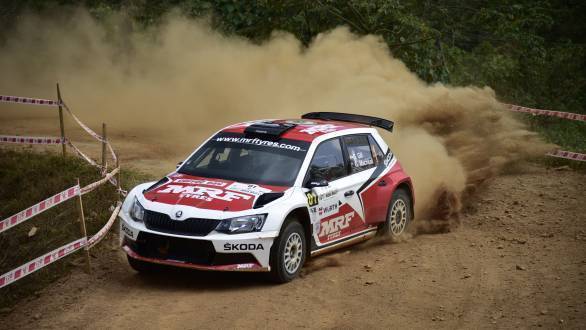 Gaurav Gill and Glenn Macneall on their way to a historic win at the India Rally at Chikmagalur back in December 2016
Gaurav Gill and Glenn Macneall on their way to a historic win at the India Rally at Chikmagalur back in December 2016
Approximately a week before that fateful incident at Jodhpur I had a conversation with Amittrajit Ghosh, two-time Indian National Rally Champion, and Gill's teammate at Mahindra Adventure. Back then he'd said, "I think Gaurav as a whole, not only for me, but for every Indian driver associated with rallying, is a benchmark. He is the yardstick that we go by, and we know what to aim for. So it's very important that he continues to compete at least for another decade or so, if not more. And continues helping people like us know what the level is that we need to achieve."
While Gill is very clear that he plans on continuing in the INRC for as long as he can, his international rallying career is far from over. In fact, it was his foray into the World Rally Championship's WRC2 class that was just getting started. Gill competed in four rounds of the championship in 2018, driving for Team MRF. In 2019, having made the switch to JK Tyre, he was set to compete in three rounds of the championship, although he only had one full outing at Rally Turkey. But plans are afoot for 2020. Gill and JK have already signed up for the first two events of the season Argentina and Mexico and are hoping to do the full championship. While he doesn't let slip exactly what car he'll be driving next year, signs seem to point to either the Skoda Fabia R5 or the Ford Fiesta R5. We'll have to wait to find out.
My conversation with Gill ends on a somewhat sombre note. He seems full of humility and a rather uncharacteristic vulnerability. "An incident like this changes a lot the way you look at life, the way you perceive relationships, friendships, other human beings around you. You try to understand that there is so much more to life. You respect life. You respect other people," he says. Which is why his plans now extend far beyond rallying, and even beyond his driving academy. "I probably still have the 'scare' in me, from what has happened," he says. "So I try and tell everyone now to be more responsible on the streets. And I am trying to do whatever I can now, trying to get together with the traffic police, with the ministry, to try and spread awareness about road safety. So that's my aim from 2020," he ends. But he's already proved that fears that he might slow down in a professional capacity are truly unfounded. At the time of going to press, Gill had just taken a commanding win at the Popular Rally the season finale of the 2019 INRC. Looks like the pep talks he's been giving himself are working. On to 2020, then!
Starts Rs 7.95 Lakhs
1497cc
Automatic
110.1
300
-NA-









